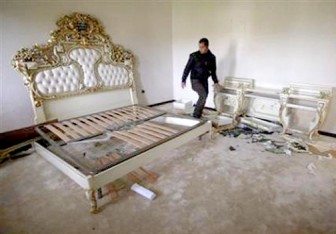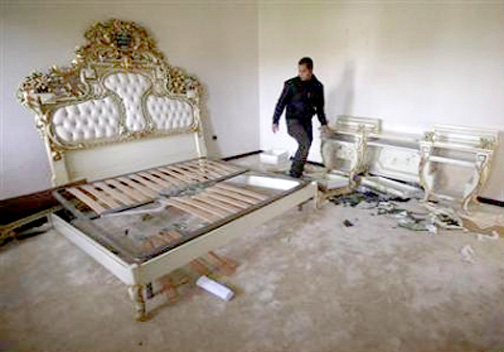AL-UQAYLA, Libya, (Reuters) – Libyan rebels pushed west yesterday, extending their grip on a key coast road as Muammar Gaddafi received a warning he would be held to account at The Hague for suspected crimes by his security forces.

Venezuela said the Libyan leader had agreed to its proposal for an international commission to negotiate an end to the turmoil in the world’s 12th largest oil exporting nation.
But Gaddafi’s son Saif al Islam said there was no need for any foreign mediation in the crisis, a leader of the uprising rejected talks with the veteran leader, and the Arab League said cautiously the plan was “under consideration”.
In Paris, French Foreign Minister Alain Juppe said France and Britain would support the idea of setting up a no-fly zone over Libya if Gaddafi’s forces continued to attack civilians.
U.S. President Barack Obama said the United States and the international community must be ready to act rapidly to stop violence against civilians or a humanitarian crisis in Libya.
The uprising, the bloodiest yet against a long-serving ruler in the Middle East or North Africa, has torn through the OPEC-member country and knocked out nearly 50 percent of its 1.6 million barrels per day output, the bedrock of its economy.
In eastern Libya, witnesses said a warplane bombed Brega the oil terminal town 800 km (500 miles) east of Tripoli, for the second day, part of a struggle for control of a strategically vital coast road and oil industry facilities.
Warplanes also launched two raids against the nearby rebel-held town of Ajbadiya, witnesses said.
But Juma Amer, secretary for african affairs at the Libyan Foreign Ministry, told journalists: “Media reports that civilian areas were bombed are false. Police had been and are urged to use maximum self restraint.”
Saif said Brega was bombed to scare off militia fighters and to gain control of oil installations.
“First of all the bombs (were) just to frighten them to go away,” he told Britain’s Sky News.
On the ground, rebels leading the unprecedented popular revolt pushed their front line west of Brega.
They said they had driven back troops loyal to Gaddafi to Ras Lanuf, site of another major oil terminal and 600 km (375 miles) east of Tripoli.
They also said they had captured a group of mercenaries.
In an angry scene at al-Uqayla, east of Ras Lanuf, a rebel shouted at a captured young African and alleged mercenary: “You were carrying guns, yes or no? You were with Gaddafi’s brigades yes or no?”
The silent youth was shoved onto his knees into the dirt. A man held a pistol close to the boy’s face before a reporter protested and told the man the rebels were not judges.
In The Hague, International Criminal Court prosecutor Luis Moreno-Ocampo said Gaddafi and members of his inner circle, could be investigated for alleged crimes committed since the uprising broke out in mid-February.
“We have identified some individuals in the de facto or former authority who have authority over the security forces who allegedly committed the crimes,” Moreno-Ocampo said.
“They are Muammar Gaddafi, his inner circle including some of his sons, who had this de facto authority. There are also some people with formal authority who should pay attention to crimes committed by their people.”
Libyan government spokesman Musa Ibrahim told BBC radio the news from The Hague was “close to a joke”.
“No fact-finding mission has been sent to Libya. No diplomats, no ministers, no NGOs or organisations of any type were sent to Libya to check the facts … No one can be sent to prison based on media reports,” he said.
Ibrahim Mohammad Ali, a spokesman for the public security department, said Libya had told the United Nations it would allow visits by independent human rights observers.
Libya is not a signatory of the ICC treaty, “but we are willing to deal with the ICC and take action against anyone who has acted outside the law,” he told a Tripoli news conference.
A spokesman for Venezuelan President Hugo Chavez, a Gaddafi ally, said the Libyan government had accepted a Venezuelan plan to seek a negotiated solution to the conflict in Libya. Arab League Secretary-General Amr Moussa said the plan was under consideration and he was waiting for details from Caracas.
SCEPTICISM OVER
CHAVEZ PLAN
Oil prices fell briefly on news of the plan, but traders said the fall was due to profit-taking and they were sceptical about any Venezuelan mediation. Brent crude fell more than $3 but by 2000 GMT had recovered to $114.82.
Chavez’s plan would involve a commission from Latin America, Europe and the Middle East trying to reach a negotiated outcome between the Libyan leader and rebel forces.
An aide to Mustafa Abdel Jalil, head of the rebels’ National Libyan Council, told Reuters the rebels were open to talks only on Gaddafi’s resignation or exile to avoid more bloodshed.
“There is nothing else to negotiate,” he said.
He also called for foreign air strikes to set up a “no-fly zone” to help the rebels topple Gaddafi.

